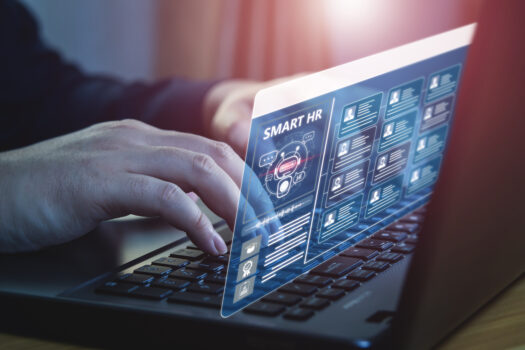As long as there has been technology, the hospitality industry has evolved along with it, and it’s no different with the latest and most significant advancement: Artificial Intelligence (AI). As predicted by hospitality industry trends, AI is continuously being adopted into different sectors across the hospitality industry as it improves. This largely comes from its cost-effectiveness, user-friendliness, and better customization and integrations.
AI’s integration into the hospitality industry has also resulted from the benefits it helps achieve, like enhanced customer services, operational efficiency, efficient revenue management, and efficient guest interactions. So, how are hotel brands utilizing AI to their advantage?
How AI in the Hotel Industry is Being Viewed
AI in the hotel industry is estimated to surpass the $1,2 billion mark by 2026, growing to an estimated CAGR of more than 9.7% from 2021 to 2026. This attests to the hospitality industry witnessing a paradigm shift in utilizing AI. The reason for this is the need to streamline processes and provide exceptional customer experiences that consumers are used to in other industries.
Tech companies have also played a significant role in enhancing the adoption of AI in the hotel industry and enabling various sectors to leverage AI at a full scale. The top 10 hospitality trends and innovations has shown that tech companies are continuously improving on AI, especially in their capacity to automate tasks like price forecasting using historical data. Besides this, AI technologies are making huge leaps forward, with significant breakthroughs coming along the way, as predicted by most hospitality trends.

How AI in the Hotel Industry Helps Different Sectors
AI has impacted the hotel industry across different sectors and departments, from hotel operations, revenue management, marketing, and sales to guest experience, to mention a few. Here’s a detailed view of how it has impacted the top five hospitality sectors.
Human Resources and Labor
AI in the hotel industry has been integrated into human resources and labor in several ways. One significant way is automating repetitive tasks like scheduling interviews, screening resumes, and conducting background checks. AI has also been used in predictive analysis to forecast market trends and employee behaviors, optimize workforce management and schedules by forecasting demands, and adjust staffing levels.
Revenue Management
Integrating AI in the hotel industry is also impacting revenue management in several ways. For example, AI-driven analytics provides hotels with comprehensive insights into their revenue. It identifies anomalies and emerging trends with its data, enabling it to make proactive decisions, optimize its revenue performance, and reveal new revenue opportunities.
On the other hand, predictive AI enhances inventory management by forecasting demand and adjusting room availability, accordingly, leading to increased revenues. It also helps analyze individual guests according to their past behavior, preferences, and demographics, allowing hotels to target the right guests at the right time and maximize their revenue.
Guest Experience
There are various ways that AI is being integrated into the hotel industry to enhance guest experience. One good example is the AI-enabled chatbots. These AI-enabled virtual agents can assist with bookings, handle routine queries, provide information about hotel services, and offer more services that guarantee custom satisfaction.
Hotel Operations
AI has also been integrated into hotel operations to enhance efficiency and provide personalized guest services. Some options include contactless check-ins, smart housekeeping room assistants, and smart building systems.

Marketing
AI-driven analytics has been the most considered AI tech in marketing in the hospitality industry. It enables more personalized and targeted marketing campaigns based on guests’ past behaviors, demographics, and preferences. It also automates digital advertising campaigns by identifying the right audience, effective advertising channels, and the best times to advertise.
Applying AI To Various Applications in Hospitality
While the use of AI in the hotel industry is still in its infancy, it has already gained a lot of practical applications across different sectors. Some of these practical applications include the following:
Chatbots and Messaging
This is the most successful way the hospitality industry has deployed artificial intelligence within its sectors. For instance, AI-enabled chatbots are used in social media platforms, allowing customers to ask questions and get instant answers anytime, something that’s almost impossible to maintain through human-to-human interaction.
Digital Concierges
AI is eliminating the need to interact with actual humans in concierge service. This cuts across all possible service guests need, including asking for extra towels, Wi-Fi passwords, and anything in between.
IoTs and Voice Activation
In the ages of Sris and Alexas, voice activation needs no introduction. This technology relies on AI-enabled Natural Language Processing (NLP) to recognize speech and respond accordingly. This has helped hoteliers personalize their customers’ interactions by creating unique experiences that will keep them returning.
Product Placement
By combining geolocation and data from predictive algorithms, AI enables hotels to offer real-time recommendations to their guests through mobile apps. These AI-enabled mobile apps algorithmically analyze historical data to understand customers’ preferences and make the right recommendations.
Customer Loyalty Programs
Loyalty programs play a significant role in the hospitality industry and have helped hotels and other related businesses secure repeat customers. As the number of participants increases, AI integration is helping streamline these programs by using customer data to create personalized offerings for repeat customers. This has cemented customer loyalty, secured a faithful customer base, and avoided churn.
Email Automation
Email automation is not new, but AI has significantly impacted its use in the hospitality industry. This is a result of Natural Language Processing that helps hotels manage large volumes of email requests and respond to them almost instantaneously.
Successful Examples of AI In the Hotel Industry
As different sectors in the hospitality industry find ways to integrate AI into their regular activities, several hotels and services have successfully integrated it.
Trip Gen was created by Trip.com as a chatbox that provides its users with live assistance using advanced Natural Language Processing. It offers personalized search solutions for travel guides, hotels, and flights. On top of that, it’s available in four languages.
Wynn Las Vegas is currently using 5,000 Amazon Echos in all of its rooms to enhance its guests’ experience. With this AI-enabled tech, guests are able to control their room temperature, television, lights, and drapery using voice commands.
Finally, when it comes to robotic concierge, Hilton has taken things a notch higher with a 58-cm tall physical humanoid android powered (Connie) by IBM’s AI, Watson. This humanoid android has its inquiry desk next to the reception area ready to answer any questions about navigation around the hotel.
Leverage AI in the Hotel Industry with NewGen Advisory
The integration of AI in the hotel industry is undoubtedly increasing daily. This has primarily resulted from its benefits, including streamlining hotel operations, reducing administration costs, and increasing efficiency.
At NewGen Advisory, we’re committed to helping investors and hoteliers leverage AI to maximize their revenue and profit rates. Contact us today to learn how we can help you integrate AI to scale your hospitality business.


